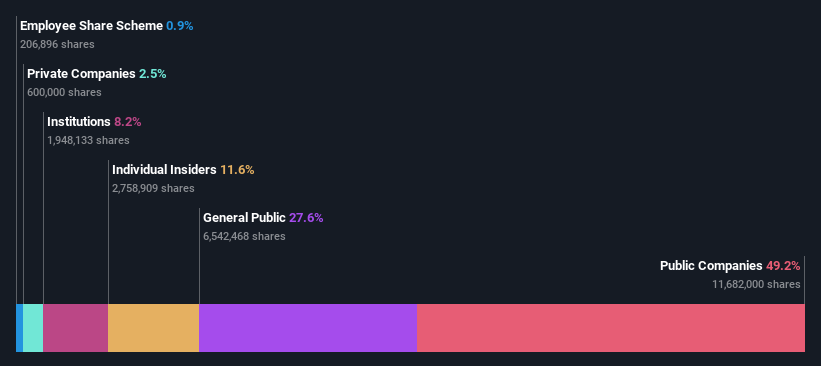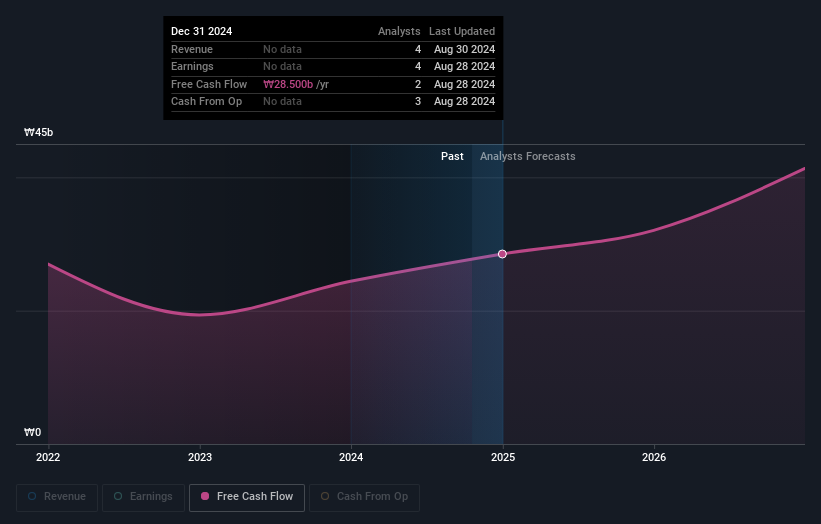DEAR U Co., LTD.'s (KOSDAQ:376300) biggest owners are public companies who got richer after stock soared 18% last week
Key Insights
- The considerable ownership by public companies in DEAR U indicates that they collectively have a greater say in management and business strategy
- The top 3 shareholders own 57% of the company
- 12% of DEAR U is held by insiders
If you want to know who really controls DEAR U Co., LTD. (KOSDAQ:376300), then you'll have to look at the makeup of its share registry. With 49% stake, public companies possess the maximum shares in the company. Put another way, the group faces the maximum upside potential (or downside risk).
As a result, public companies collectively scored the highest last week as the company hit ₩586b market cap following a 18% gain in the stock.
In the chart below, we zoom in on the different ownership groups of DEAR U.
See our latest analysis for DEAR U

What Does The Institutional Ownership Tell Us About DEAR U?
Many institutions measure their performance against an index that approximates the local market. So they usually pay more attention to companies that are included in major indices.
As you can see, institutional investors have a fair amount of stake in DEAR U. This implies the analysts working for those institutions have looked at the stock and they like it. But just like anyone else, they could be wrong. It is not uncommon to see a big share price drop if two large institutional investors try to sell out of a stock at the same time. So it is worth checking the past earnings trajectory of DEAR U, (below). Of course, keep in mind that there are other factors to consider, too.

Hedge funds don't have many shares in DEAR U. SM Entertainment Co., Ltd. is currently the company's largest shareholder with 31% of shares outstanding. With 18% and 8.3% of the shares outstanding respectively, JYP Entertainment Corporation and Jong An are the second and third largest shareholders.
After doing some more digging, we found that the top 3 shareholders collectively control more than half of the company's shares, implying that they have considerable power to influence the company's decisions.
While it makes sense to study institutional ownership data for a company, it also makes sense to study analyst sentiments to know which way the wind is blowing. There are a reasonable number of analysts covering the stock, so it might be useful to find out their aggregate view on the future.
Insider Ownership Of DEAR U
The definition of company insiders can be subjective and does vary between jurisdictions. Our data reflects individual insiders, capturing board members at the very least. Management ultimately answers to the board. However, it is not uncommon for managers to be executive board members, especially if they are a founder or the CEO.
I generally consider insider ownership to be a good thing. However, on some occasions it makes it more difficult for other shareholders to hold the board accountable for decisions.
It seems insiders own a significant proportion of DEAR U Co., LTD.. It has a market capitalization of just ₩586b, and insiders have ₩68b worth of shares in their own names. It is great to see insiders so invested in the business. It might be worth checking if those insiders have been buying recently.
General Public Ownership
The general public-- including retail investors -- own 28% stake in the company, and hence can't easily be ignored. While this group can't necessarily call the shots, it can certainly have a real influence on how the company is run.
Public Company Ownership
It appears to us that public companies own 49% of DEAR U. It's hard to say for sure but this suggests they have entwined business interests. This might be a strategic stake, so it's worth watching this space for changes in ownership.
Next Steps:
While it is well worth considering the different groups that own a company, there are other factors that are even more important.
I always like to check for a history of revenue growth. You can too, by accessing this free chart of historic revenue and earnings in this detailed graph.
If you are like me, you may want to think about whether this company will grow or shrink. Luckily, you can check this free report showing analyst forecasts for its future.
NB: Figures in this article are calculated using data from the last twelve months, which refer to the 12-month period ending on the last date of the month the financial statement is dated. This may not be consistent with full year annual report figures.
Have feedback on this article? Concerned about the content? Get in touch with us directly. Alternatively, email editorial-team (at) simplywallst.com.
This article by Simply Wall St is general in nature. We provide commentary based on historical data and analyst forecasts only using an unbiased methodology and our articles are not intended to be financial advice. It does not constitute a recommendation to buy or sell any stock, and does not take account of your objectives, or your financial situation. We aim to bring you long-term focused analysis driven by fundamental data. Note that our analysis may not factor in the latest price-sensitive company announcements or qualitative material. Simply Wall St has no position in any stocks mentioned.
 Index Options
Index Options CME Group
CME Group Nasdaq
Nasdaq Cboe
Cboe TradingView
TradingView Wall Street Journal
Wall Street Journal